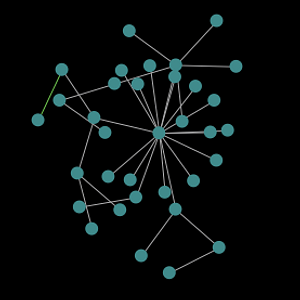- About the Course:
In this course you'll learn about the tools used by scientists to understand complex systems. The topics you'll learn about include dynamics, chaos, fractals, information theory, self-organization, agent-based modeling, and networks. You’ll also get a sense of how these topics fit together to help explain how complexity arises and evolves in nature, society, and technology. There are no prerequisites. You don't need a science or math background to take this introductory course; it simply requires an interest in the field and the willingness to participate in a hands-on approach to the subject.
- About the Instructor(s):
 Melanie Mitchell is Professor of Computer Science at Portland State University, and External Professor and Member of the Science Board at the Santa Fe Institute. She is the author or editor of five books and over 70 scholarly papers in the fields of artificial intelligence, cognitive science, and complex systems. Her most recent book, Complexity: A Guided Tour, published in 2009 by Oxford University Press, won the 2010 Phi Beta Kappa Science Book Award. It was also named by Amazon.com as one of the ten best science books of 2009, and was longlisted for the Royal Society's 2010 book prize.
Melanie Mitchell is Professor of Computer Science at Portland State University, and External Professor and Member of the Science Board at the Santa Fe Institute. She is the author or editor of five books and over 70 scholarly papers in the fields of artificial intelligence, cognitive science, and complex systems. Her most recent book, Complexity: A Guided Tour, published in 2009 by Oxford University Press, won the 2010 Phi Beta Kappa Science Book Award. It was also named by Amazon.com as one of the ten best science books of 2009, and was longlisted for the Royal Society's 2010 book prize.- Course Team:
 Jonathan Straus (Teaching Assistant) is finishing his Master’s degree in Systems Science at Portland State University, with the pursuit of a Sociology PhD on the horizon. In the carefree-ish days of his extended adolescence, he hung out a lot tutoring math and sciences in several countries (as well as offering alternatives to expensive test preparation), although he has recently spent more time working with the Systems Science program and University Studies to bring systems thinking into PSU’s general curriculum, while teaching an interdisciplinary course on complex social networks. In addition to geeking out on network theory, Jonathan is interested in modeling collective social action, dissemination of culture/moral norms, and the challenges involved with ensuring an informed public and policies based on science.
Jonathan Straus (Teaching Assistant) is finishing his Master’s degree in Systems Science at Portland State University, with the pursuit of a Sociology PhD on the horizon. In the carefree-ish days of his extended adolescence, he hung out a lot tutoring math and sciences in several countries (as well as offering alternatives to expensive test preparation), although he has recently spent more time working with the Systems Science program and University Studies to bring systems thinking into PSU’s general curriculum, while teaching an interdisciplinary course on complex social networks. In addition to geeking out on network theory, Jonathan is interested in modeling collective social action, dissemination of culture/moral norms, and the challenges involved with ensuring an informed public and policies based on science. Emily Prouty (Program Assistant) has a background in international development with extensive experience in Latin America and a Masters in Community Development and Action from Vanderbilt University. She is interested in the application of complexity theory to the challenges facing rapidly urbanizing communities abroad.
Emily Prouty (Program Assistant) has a background in international development with extensive experience in Latin America and a Masters in Community Development and Action from Vanderbilt University. She is interested in the application of complexity theory to the challenges facing rapidly urbanizing communities abroad.- How to use Complexity Explorer:
- How to use Complexity Explorer
- Enrolled students:
-
3,943
- Course dates:
-
31 Mar 2014 2pm UTC to
16 Jun 2014 7am UTC - Prerequisites:
-
None
- Like this course?
- Donate to help fund more like it
- Twitter link
- Follow Course on Twitter
Syllabus
- What is Complexity?
- Dynamics and Chaos
- Fractals
- Information, Order, and Randomness
- Genetic Algorithms
- Cellular Automata
- Models of Biological Self-Organization
- Models of Cooperation in Social Systems
- Networks
- Scaling in Biology and Society
- Wrapping Up; Virtual Field Trip
